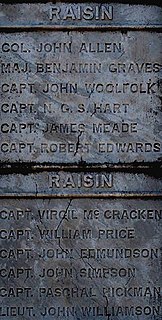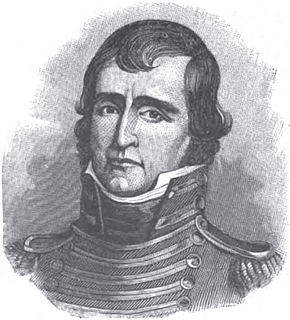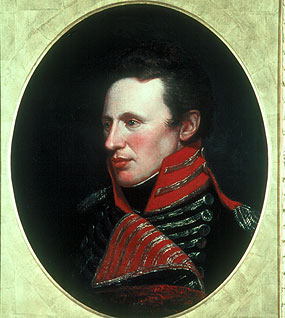 W
WJohn Allen was a United States politician and army officer who was killed in the War of 1812.
 W
WLieutenant William Ward Burrows II was an officer in the United States Navy during the First Barbary War and the War of 1812. His father, William Ward Burrows I, was the second Commandant of the Marine Corps.
 W
WJoseph Louis Cook, or Akiatonharónkwen (Mohawk), was an Iroquois leader and commissioned officer in the Continental Army during the American Revolution. Born to an African father and an Abenaki mother in what is now Schuylerville, New York, he and his mother were taken captive in a French-Mohawk raid and taken to Kahnawake, a Mohawk village south of Montreal. They were adopted by a Mohawk family. His mother soon died and he served Catholic missionaries, learning French. He became an influential leader among the Mohawk and distinguished himself as a warrior for their allies the French during the French and Indian War.
 W
WMajor Joseph Hamilton Daveiss commanded the Dragoons of the Indiana Militia at the Battle of Tippecanoe, in which he was fatally wounded. Earlier, he had played a role in unsuccessful efforts to prove Aaron Burr guilty of betraying the country. Several places in the United States are named for Daveiss, but though he spelled his name "Daveiss", these places all have the spelling "Daviess".
 W
WPaschal Hickman was an American military officer who was killed in the Massacre of the River Raisin, an important event in the War of 1812. Hickman County, Kentucky is named for him.
 W
WMajor Andrew Hunter Holmes born in Fairfax County, Virginia, was an American army officer. He was Captain, of the 24th Infantry in the War of 1812 and was promoted to major June 8, 1813. On April 18, 1814, he was Major of the 32nd Infantry. He was victorious at the Battle of Longwoods in Upper Canada but was killed August 4, 1814, in an attack on Fort Mackinac, Michigan, in the Battle of Mackinac Island. Holmes County, Ohio, and Holmesville, Mississippi, are named for him.
 W
WJames Lawrence was an American naval officer. During the War of 1812, he commanded USS Chesapeake in a single-ship action against HMS Shannon commanded by Philip Broke. He is probably best known today for his last words or "dying command" "Don't give up the ship!", which is still a popular naval battle cry, and which was invoked by Oliver Hazard Perry's personal battle flag, adopted to commemorate his dead friend.
 W
WLemuel Purnell Montgomery was an American military officer who fought in the Creek War. Montgomery was an attorney in Nashville, Tennessee, when the War of 1812 broke out, and was commissioned as a major of the 39th Infantry. He was killed in the Battle of Horseshoe Bend, at the conclusion of the Creek War, on March 27, 1814.
 W
WZebulon Montgomery Pike was an American brigadier general and explorer for whom Pikes Peak in Colorado was named. As a U.S. Army officer he led two expeditions under authority of President Thomas Jefferson through the new Louisiana Purchase territory, first in 1805–1806 to reconnoiter the upper northern reaches of the Mississippi River, and then in 1806–1807 to explore the Southwest to the fringes of the northern Spanish-colonial settlements of New Mexico and Texas. Pike's expeditions coincided with other Jeffersonian expeditions, including the Lewis and Clark Expedition (1804–1806) and the Thomas Freeman and Peter Custis expedition up the Red River (1806).
 W
WBorn Frederick Hall who used the alias William Williams as a runaway African American slave who enlisted as a private in the U.S. Army during the War of 1812 and who died from a mortal wound while defending Fort McHenry from the British naval bombardment in 1814.